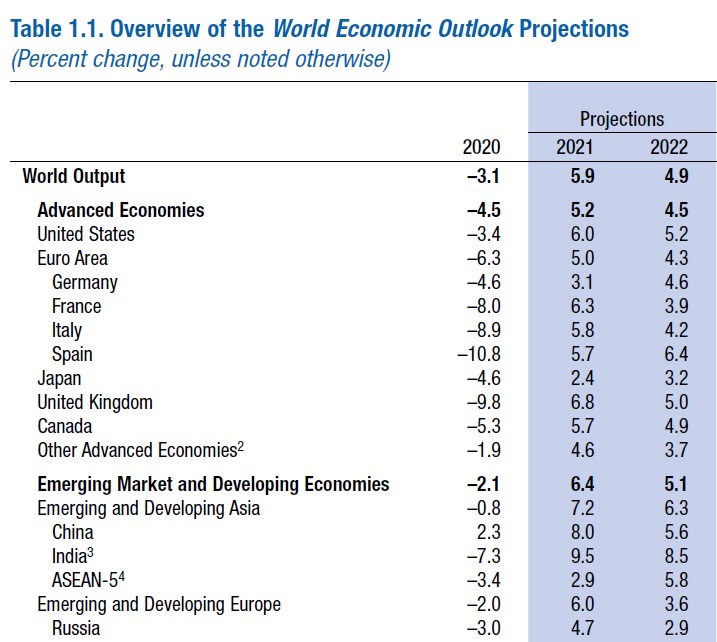The International Monetary Fund (IMF) has published autumn forecasts for the world economy, indicating that the world economy will grow by 5.9% this year, which is 0.1% less than previously forecast. In turn, an increase of 4.9% is forecast for next year.
However, the IMF warns that global supply chain disruptions are causing prices to rise and dampening the momentum of recovery for economies trying to recover from the Covid-19 pandemic. Turning to the Baltic States, fund forecastthat Latvia is expected to experience the slowest economic growth from the Baltic States this year.
IMF forecast for economic growth in European countries (%)
Photo: SVF
–
–
Estonia is expected to have the fastest economic growth in the Baltics
The IMF forecasts 5% GDP growth in the eurozone this year, while economic growth is forecast at 4.3% next year.
Latvia is forecast to have the slowest growth in the Baltic States this year, with the economy growing by 4.5% in 2021 and 5.2% next year.
In Estonia, economic growth is forecast at 8.5% this year, while in Lithuania, GDP is forecast to grow by 4.7%.
The US economy is expected to grow by 6% this year, which is one percent less than forecast in July. In China, on the other hand, economic growth is forecast at 8% this year, which is 0.1% less than in July. However, it is still the biggest growth since 2011. In Russia, meanwhile, GDP is forecast to grow by 4.7% this year.
The crisis will have to be overcome together
IMF: supply chain disruptions drive inflation and slow economic recoveryRihards Plūme
—
As Gita Gopinata, the chief economist of the International Monetary Fund, explained, although the outlook for the global economy as a whole may seem relatively positive, the overall figures mask major declines and difficulties in countries such as the United States, Germany and Japan, which are experiencing supply problems.
“We are still seeing a global recovery, but the momentum has waned. The effects are linked to a pandemic, a delta variant, a supply chain disruption leading to an energy crisis in Europe and Asia. Inflation has been a concern in many parts of the world, ”says Gopinata.
“I think in recent months we have realized that we are in this crisis together and it will not end anywhere until it is over everywhere. And that requires vaccination coverage to expand and increase in different parts of the world. ”
The rise in energy prices could slow next year

IMF forecast for economic growth (%)
Photo: SVF
–
–
The IMF economist expects the rise in energy prices to slow down early next year.
According to the International Monetary Fund, the large “vaccine gap” will affect the recovery of living standards. While the challenges for the richest countries are expected in the near future, the impact will be longer in developing countries. Namely, the lasting impact of the pandemic could reduce world GDP by $ 5.3 trillion over the next five years.
The IMF economist has acknowledged that dangerous differences in economic prospects between countries remain a major concern. Developed countries are expected to recover from pre-pandemic trends in 2022 and to exceed it by almost a percentage point in 2024.
However, in developing countries other than China, growth is expected to remain 5.5% lower in 2024 than before the pandemic.
–
Highlight text and press Ctrl+Enterto send the text to be edited!
Highlight text and press Report a bug buttons to send the text to be edited!
–
–


